
A pamphleteer is a historical term used to describe someone who creates or distributes pamphlets, unbound (therefore inexpensive) booklets intended for wide circulation.

A pamphleteer is a historical term used to describe someone who creates or distributes pamphlets, unbound (therefore inexpensive) booklets intended for wide circulation.
Pamphlets were used to broadcast the writer's opinions: to articulate a political ideology, for example, or to encourage people to vote for a particular politician. Early modern news pamphlets also made extensive use of stock imagery to describe, highlight, or criticize various social and cultural events and issues. [1] During times of political unrest, such as the French Revolution, pamphleteers were highly active in attempting to shape public opinion. Before the advent of telecommunications, those with access to a printing press and a supply of paper often used pamphlets to widely disseminate their ideas.
Thomas Paine's pamphlets were influential in the history of the American Revolutionary War. [2] 17th-century Dutch naval officer Witte de With wrote papers mocking and praising his fellow officers.[ citation needed ] Poet and polemicist John Milton published pamphlets as well. Jonathan Edwards and John Calvin changed the course of Christianity with their pamphlets.

Daniel Defoe was an English novelist, journalist, merchant, pamphleteer and spy. He is most famous for his novel Robinson Crusoe, published in 1719, which is claimed to be second only to the Bible in its number of translations. He has been seen as one of the earliest proponents of the English novel, and helped to popularise the form in Britain with others such as Aphra Behn and Samuel Richardson. Defoe wrote many political tracts, was often in trouble with the authorities, and spent a period in prison. Intellectuals and political leaders paid attention to his fresh ideas and sometimes consulted him.
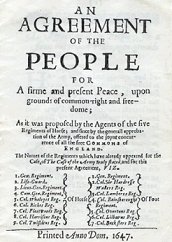
The Levellers were a political movement active during the English Civil War who were committed to popular sovereignty, extended suffrage, equality before the law and religious tolerance. The hallmark of Leveller thought was its populism, as shown by its emphasis on equal natural rights, and their practice of reaching the public through pamphlets, petitions and vocal appeals to the crowd.

Roundheads were the supporters of the Parliament of England during the English Civil War (1642–1651). Also known as Parliamentarians, they fought against King Charles I of England and his supporters, known as the Cavaliers or Royalists, who claimed rule by absolute monarchy and the principle of the divine right of kings. The goal of the Roundheads was to give to Parliament the supreme control over executive administration of the country/kingdom.
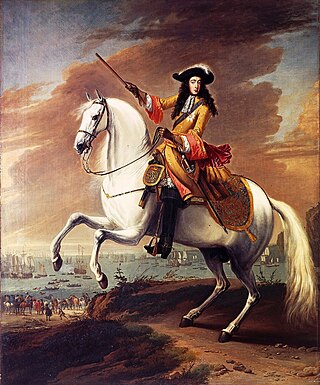
The English Revolution is a term that has been used to describe two separate events in English history. Prior to the 20th century, it was generally applied to the 1688 Glorious Revolution, when James II was deposed and a constitutional monarchy established under William III and Mary II.

A tyrant, in the modern English usage of the word, is an absolute ruler who is unrestrained by law, or one who has usurped a legitimate ruler's sovereignty. Often portrayed as cruel, tyrants may defend their positions by resorting to repressive means. The original Greek term meant an absolute sovereign who came to power without constitutional right, yet the word had a neutral connotation during the Archaic and early Classical periods. However, Greek philosopher Plato saw tyrannos as a negative form of government, and on account of the decisive influence of philosophy on politics, deemed tyranny the "fourth and worst disorder of a state."
Tyrants lack "the very faculty that is the instrument of judgment"—reason. The tyrannical man is enslaved because the best part of him (reason) is enslaved, and likewise, the tyrannical state is enslaved, because it too lacks reason and order.

John Toland was an Irish rationalist philosopher and freethinker, and occasional satirist, who wrote numerous books and pamphlets on political philosophy and philosophy of religion, which are early expressions of the philosophy of the Age of Enlightenment. Born in Ireland, he was educated at the universities of Glasgow, Edinburgh, Leiden and Oxford and was influenced by the philosophy of John Locke.

A pamphlet is an unbound book. Pamphlets may consist of a single sheet of paper that is printed on both sides and folded in half, in thirds, or in fourths, called a leaflet or it may consist of a few pages that are folded in half and saddle stapled at the crease to make a simple book.

Polemic is contentious rhetoric intended to support a specific position by forthright claims and to undermine the opposing position. The practice of such argumentation is called polemics, which are seen in arguments on controversial topics. A person who writes polemics, or speaks polemically, is called a polemicist. The word derives from Ancient Greek πολεμικός 'warlike, hostile', from πόλεμος 'war'.

Samuel Johnson (1649–1703) was an English clergyman and political writer, sometimes called "the Whig Johnson" to distinguish him from the author and lexicographer of the same name, who was a Tory in politics and lived after him. He is one of the best known pamphlet writers who developed Whig resistance theory.
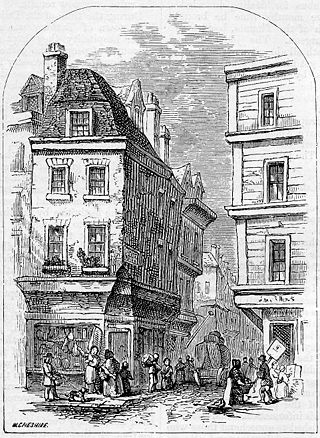
Until the early 19th century, Grub Street was a street close to London's impoverished Moorfields district that ran from Fore Street east of St Giles-without-Cripplegate north to Chiswell Street. It was pierced along its length with narrow entrances to alleys and courts, many of which retained the names of early signboards. Its bohemian society was set amidst the impoverished neighbourhood's low-rent dosshouses, brothels and coffeehouses.
The Good Old Cause was the name given, retrospectively, by the soldiers of the New Model Army, to the complex of reasons that motivated their fight on behalf of the Parliament of England.
Western literature, also known as European literature, is the literature written in the context of Western culture in the languages of Europe, and is shaped by the periods in which they were conceived, with each period containing prominent western authors, poets, and pieces of literature.
Marchamont Nedham, also Marchmont and Needham, was a journalist, publisher and pamphleteer during the English Civil War who wrote official news and propaganda for both sides of the conflict.

A tract is a literary work and, in current usage, usually religious in nature. The notion of what constitutes a tract has changed over time. By the early part of the 21st century, a tract referred to a brief pamphlet used for religious and political purposes. Tracts are often either left for someone to find or handed out. However, there have been times in history when the term implied tome-like works. A tractate, a derivative of a tract, is equivalent in Hebrew literature to a chapter of the Christian Bible.
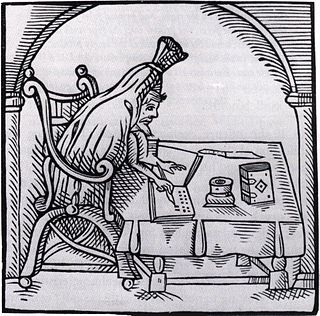
Robert Greene (1558–1592) was an English author popular in his day, and now best known for a posthumous pamphlet attributed to him, Greene's Groats-Worth of Witte, bought with a million of Repentance, widely believed to contain an attack on William Shakespeare. Greene was a popular Elizabethan dramatist and pamphleteer known for his negative critiques of his colleagues. He is said to have been born in Norwich. He attended Cambridge where he received a BA in 1580, and an M.A. in 1583 before moving to London, where he arguably became the first professional author in England. He was prolific and published in many genres including romances, plays and autobiography.
Most textbooks date the establishment of the "Publicity Bureau" in 1900 as the start of the modern public relations (PR) profession. Of course, there were many early forms of public influence and communications management in history. Basil Clarke is considered the founder of the PR profession in Britain with his establishment of Editorial Services in 1924. Academic Noel Turnball points out that systematic PR was employed in Britain first by religious evangelicals and Victorian reformers, especially opponents of slavery. In each case the early promoters focused on their particular movement and were not for hire more generally.
John Streater was an English soldier, political writer and printer. An opponent of Oliver Cromwell, Streater was a "key republican critic of the regime" He was a leading example of the "commonwealthmen", one division among the English republicans of the period, along with James Harrington, Edmund Ludlow, and Henry Nevile.
A novel is an extended work of narrative fiction usually written in prose and published as a book. The English word to describe such a work derives from the Italian: novella for "new", "news", or "short story ", itself from the Latin: novella, a singular noun use of the neuter plural of novellus, diminutive of novus, meaning "new". According to Margaret Doody, the novel has "a continuous and comprehensive history of about two thousand years", with its origins in the Ancient Greek and Roman novel, Medieval Chivalric romance, and in the tradition of the Italian Renaissance novella. The ancient romance form was revived by Romanticism, in the historical romances of Walter Scott and the Gothic novel. Some novelists, including Nathaniel Hawthorne, Herman Melville, Ann Radcliffe, and John Cowper Powys, preferred the term "romance". Such "romances" should not be confused with the genre fiction romance novel, which focuses on romantic love. M. H. Abrams and Walter Scott have argued that a novel is a fiction narrative that displays a realistic depiction of the state of a society, while the romance encompasses any fictitious narrative that emphasizes marvellous or uncommon incidents. Works of fiction that include marvellous or uncommon incidents are also novels, including Mary Shelley's Frankenstein, J. R. R. Tolkien's The Lord of the Rings, and Harper Lee's To Kill a Mockingbird.
Pamphlet wars refer to any protracted argument or discussion through printed medium, especially between the time the printing press became common, and when state intervention like copyright laws made such public discourse more difficult. The purpose was to defend or attack a certain perspective or idea. Pamphlet wars have occurred multiple times throughout history, as both social and political platforms. Pamphlet wars became viable platforms for this protracted discussion with the advent and spread of the printing press. Cheap printing presses, and increased literacy made the late 17th century a key stepping stone for the development of pamphlet wars, a period of prolific use of this type of debate. Over 2200 pamphlets were published between 1600–1715 alone.
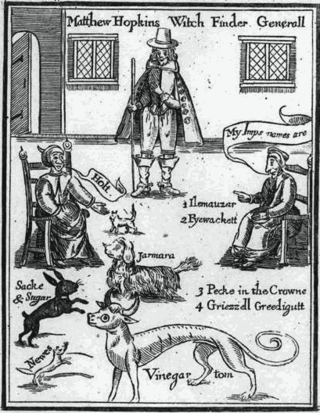
In England, witch trials were conducted from the 15th century until the 18th century. They are estimated to have resulted in the death of perhaps 500 people, 90 percent of whom were women. The witch hunt was at its most intense stage during the English Civil War (1642–1651) and the Puritan era of the mid-17th century.